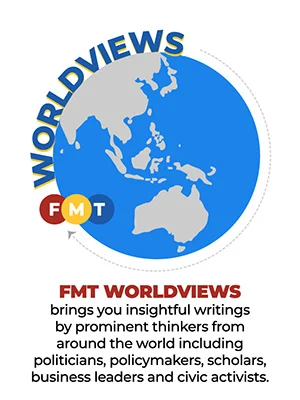Kristalina Georgieva’s reappointment as managing director of the International Monetary Fund is a welcome growth, however it additionally highlights a significant flaw in the IMF’s governance construction.
In a world reeling from debt crises, violent battle, local weather change, and the lingering results of the Covid-19 pandemic, the fund’s significance is troublesome to overstate. But to fulfil its correct function, it should be accountable to all member states, not simply the highly effective international locations that at the moment wield disproportionate affect.
The reappointment course of bears immediately on this situation. On its web site, the IMF informs readers that the govt board (the place all international locations are represented) could choose a managing director by a majority of votes solid, although it has historically accomplished so by consensus.
In reality, a long-standing settlement between the Europeans and the Americans dictates that the former decides who will lead the IMF, whereas the latter chooses who will lead the World Bank. (The IMF has formally adopted “an open, merit-based, and clear course of” for choosing its managing administrators, however this has served merely as a high quality examine on the Europeans’ choose.)
It must be apparent why this association is an issue. The IMF wants all international locations to imagine that it’s performing in an even-handed method when it makes robust choices about whom to assist, and on what phrases. And although it has formal guidelines, the strongest international locations recurrently push arduous for exceptions.
The eurozone disaster underscored this battle of curiosity. The IMF’s personal subsequent analysis criticised the “perfunctory method” by which it adopted its insurance policies, and known as out its determination to short-circuit the standard course of by modifying its 2002 framework to grant European international locations distinctive entry.
The IMF’s response can’t be divorced from its European-nominated managing administrators, each of whom had beforehand served as France’s financial system and finance ministers.
As Harold James recounts in his not too long ago revealed historical past of the disaster: “The period of time and power that the managing director (Dominique Strauss-Kahn and particularly Christine Lagarde) personally spent on these programmes – together with attending numerous conferences in Brussels and different European capitals – was unprecedented in relation to the consideration given to even the largest and most necessary (IMF) programmes in Latin America or Asia. Lagarde, in contrast to her predecessors, recurrently attended the conferences of the European finance ministers.”
James does be aware that the IMF was attempting to adapt to new circumstances. But from the viewpoint of nations past Europe and the US, the particular remedy appeared clear to see. Until the appointment course of modifications, the managing director will all the time be open to the cost that she or he is overly attentive to European governments.
And the issues don’t finish there. In addition to chopping out different international locations which are equally invested in the IMF, the present course of additionally distorts the worldwide character of the establishment’s formal governance construction.
The IMF has a fastidiously crafted govt board of administrators who characterize all its members (albeit unequally). The board is completely based mostly in Washington, DC (at appreciable value), in order that it may information and oversee the organisation’s mandate and work. There is not any good cause why reappointments and efficiency evaluations shouldn’t be (genuinely) determined via this present consultant construction.
While each managing director’s efficiency is topic to luck and different circumstances past their management, an goal scorecard may very well be distilled to a few metrics of success. The first is the diploma to which a managing director has brokered settlement amongst all international locations –working to maintain the highly effective engaged whereas restraining them to make sure that others’ pursuits are thought-about. This usually means quietly organising coalitions of much less highly effective states.
Georgieva’s report on this entrance is powerful. At a time when the US has known as for the IMF to step again from main on local weather points, she has persuaded many international locations to allow the fund so as to add climate-related dangers and alternatives to its monitoring of their economies.
Similarly, though rich international locations need heavy-handed lending conditionalities (regardless of the IMF’s personal proof that these are unlikely to work), Georgieva has as an alternative discovered new methods to lend. And, lastly, in a world of intensifying geopolitical rivalry, she has labored steadfastly to maintain China engaged, reminiscent of in sovereign-debt restructurings.
Second, a managing director should be efficient in persuading member international locations to commit sources. Here, too, Georgieva has succeeded. This previous December, the IMF board of governors accepted a 50% enhance in quotas (that means core funding, not particular funds for particular tasks).
Georgieva additionally beforehand persuaded wealthier international locations to commit extra sources ought to the establishment ever want them (although donors nonetheless preserve particular management over these so-called preparations to borrow).
And throughout the pandemic, she secured settlement on a historic US$650 billion allocation of particular drawing rights (the IMF’s reserve asset) to bolster member states’ steadiness sheets. (Her tireless efforts to influence wealthier international locations to redirect their allocations to poorer international locations, nonetheless, have been much less profitable.)
Lastly, the managing director should reveal efficient management inside the organisation itself, the place there’s a fixed want to beat bureaucratic inertia; appeal to, develop, and retain glorious and various workers; and foster a tradition of studying and integrity.
With about 60% of low-income international locations at excessive threat of or in debt misery, the IMF should have the ability to deploy sources at most velocity and with the right suggestions and conditionalities. There is far room for enchancment on this entrance.
The IMF ought to get cash out the door a lot sooner, and it ought to tailor its programmes to a world the place geopolitical tensions are trumping the ideas of free commerce that it favours.
With a robust scorecard total, Georgieva is an effective choose. But that may be a completely satisfied coincidence. It doesn’t change the undeniable fact that the IMF’s reappointment course of is woefully out of step with the world of the 2020s.

The views expressed are these of the author and don’t essentially mirror these of eNM.








